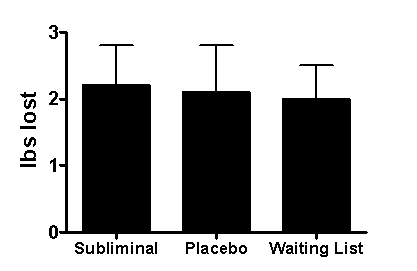Use the following to answer questions
Scenario I
Scenario I is based on and presents fabricated data consistent with the following study:
Merikle,P.M. ,& Skanes,H.E.(1992) .Subliminal self-help audiotapes: A search for placebo effects.Journal of Applied Psychology,77(5) ,772-776.doi:10.1037/0021-9010.77.5.772
Merikle and Skanes (1992) investigated the effectiveness of subliminal self-help audiotapes to promote weight loss in overweight females seeking to lose weight.Participants were randomly assigned to groups.Participants in two groups were instructed to listen to audiotapes containing subliminal messages associated with weight loss daily.Group 1 (the subliminal group) actually received these tapes.Group 2 (the placebo group) received tapes containing subliminal messages associated with relieving dental anxiety.Finally,a third group of participants was not given audiotapes and was told that they were on a waiting list to participate in the study.All participants-including the participants on the waiting list-were weighed weekly for 5 weeks.The average total weight loss (and standard deviations) for the three groups after the fifth week is presented in Figure 5.1.
Figure 5.1 
-(Scenario I) Suppose that the waiting list group did NOT lose weight.Based on these hypothetical findings,what is the MOST reasonable conclusion about the weight loss in the subliminal group?
Definitions:
Unconditioned Stimulus
In classical conditioning, a stimulus that unconditionally—naturally and automatically—triggers a response.
Conditioned Stimulus
A previously neutral stimulus that, after becoming associated with the unconditioned stimulus, eventually comes to trigger a conditioned response.
Operant Conditioning
A learning process through which the strength of a behavior is modified by reinforcement or punishment.
Classical Conditioning
A learning process that occurs when two stimuli are repeatedly paired; a response that is at first elicited by the second stimulus is eventually elicited by the first stimulus alone.
Q64: In a recent study by Wilson and
Q64: According to Freud,the dynamic unconsciousness controls well-learned
Q93: Descartes believed that the mind was part
Q130: Objects in the left visual field can
Q158: Monique Roberts wanted to find a fun
Q161: Alex occasionally has self-doubts about his ability
Q272: Remembering how to ride your bike is
Q301: Fifty percent of the time,a person with
Q313: Kelly is at a local bar having
Q323: Short-term memory is limited in how long